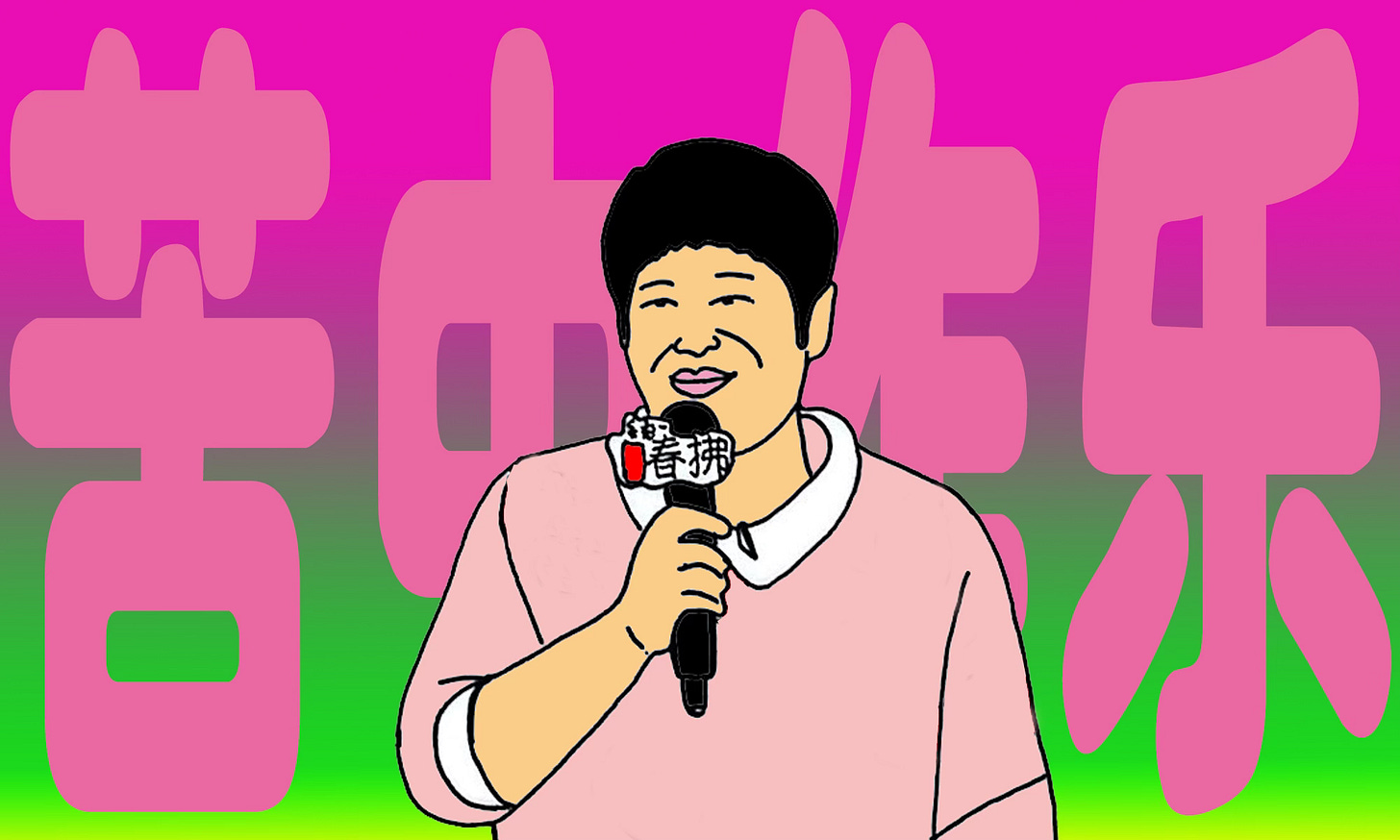"Finding joy in hardship" — Phrase of the Week
A stand-up comic brings humour out of suffering

Our phrase of the week is: “Finding joy in hardship” (苦中作乐 kǔ zhōng zuò lè)
Context
An unlikely figure has become a sensation in China’s stand-up comedy scene.
She’s a 50-year-old woman from the small village of Linyi (临沂) in Shandong Province, who goes by the stage name Director Fang (房主任).
Before she became a comedian, Fang was a housewife. She raised two daughters and worked as a cleaner to support her family. For 30 years she endured domestic violence. Her marriage was arranged by her mother - she chose a small, weak man in the hope he wouldn’t beat her.
That didn’t work out as planned. In the first month of marriage, Fang’s husband started hitting her. So did his father. When Fang told her parents about it, and asked them for permission to divorce, they refused for fear of losing face in the village.
Fang did finally divorce him in 2023 when she embarked on her comedy career.
On stage, her ex-husband is the source of some of Fang’s best jokes. She calls him a “corgi” (柯基)—a small, cute, but insecure dog.
Her popularity stems from how her comedy draws from her own life experiences, which resonate deeply with so many other women who see their own lives reflected in hers:
Director Fang’s jokes don’t rely on sophisticated references but on meticulous observations of life and an optimistic attitude of finding joy in hardship.
房主任的段子里没有高深的梗,靠的是对生活细致入微的观察与苦中作乐的豁达
Fáng zhǔrèn de duànzi lǐ méiyǒu gāoshēn de gěng, kào de shì duì shēnghuó xìzhì rùwēi de guānchá yǔ kǔzhōng zuòlè de huòdá
What it means
“Finding joy in hardship” (苦中作乐) is a four-character idiom that literally translates as “in bitterness” (苦中), “make joy” (作乐). It describes the idea of maintaining optimism and finding moments of happiness despite being in difficult circumstances.
The phrase first appeared in a self-annotation to the poem Eight Poems on Visiting Lingshan Mountain with Magistrate Chen and Registrar Huang (同陈宰黄簿游灵山八首) by Chen Zao (陈造), a Song Dynasty poet and official.
Chen Zao (1133-1203) was known as “Master of Huainan” (淮南夫子), and admired by major Song poets of the time. He suffered poverty as a low-level official for many years, barely earning enough to support himself.
Chen writes about those hardships in his poems. Unusually for that time, Chen Zao dared to criticize social customs and was willing to reflect the suffering of common people. He called himself “Old Man of Rivers and Lakes” (江湖长翁) because he felt he wasn’t contributing much to the world through his rotating county-level posts.
The poem, Eight Poems on Visiting Lingshan Mountain with Magistrate Chen and Registrar Huang, records a leisure trip he went on with fellow officials — a rare moment of respite from their administrative duties.
Chen Zao quotes one of his companions on the journey in his annotations to the poem:
“We can be said to snatch a moment of rest from busyness, and find joy amidst hardship.”
吾辈可谓忙里偷闲,苦中作乐
wú bèi kě wèi mánglǐ tōuxián, kǔzhōng zuòlè
It’s an observation about their experience: busy officials stealing moments of peace and finding joy despite the hardships of public service — a reminder that Song Dynasty bureaucrats dealt with constant pressure, limited resources, and the weight of responsibility for their communities.
It’s fitting that Director Fang is described with this idiom. Because like Chen Zao she understands hardship. She endured 30 years of domestic violence in an arranged while her husband gambled away her earnings.
Despite those hardships Fang has transformed that suffering into humour on stage, creating laughter from the darkest chapters of her life.
Andrew Methven is the author of RealTime Mandarin, a resource which helps you bridge the gap to real-world fluency in Mandarin, stay informed about China, and communicate with confidence—all through weekly immersion in real news. Subscribe for free here.
Read more about how this story is being discussed in the Chinese media in this week’s RealTime Mandarin.



